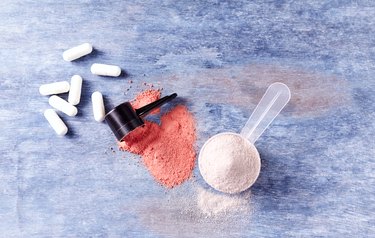
Glutamic acid can be produced by your body, sourced from common foods or taken as a glutamate supplement. Although glutamic acid is a crucial amino acid for your health and generally considered safe, incorrect supplemental use can have dangerous consequences if you have certain medical conditions.
What Is Glutamic Acid?
Video of the Day
Glutamic acid, also referred to as glutamate, is one of the most common amino acids. Amino acids are the building blocks of proteins which your body needs for growth, repair and maintenance of tissue. Considered a non-essential amino acid because your body has the ability to produce it, glutamic acid plays many roles in your cells.
Video of the Day
In addition to being a component of proteins, glutamic acid is an intermediate player in metabolic pathways for energy production, nitrogen metabolism oxidative stress response, as reported in a study published in Nephrology Dialysis Transplantation in October 2015.
Glutamate is a major neurotransmitter, or chemical messenger, between neurons and other cells in the central nervous system. It also influences cells in other tissue such as bone, testis, pancreas and adrenal glands, according to a December 2015 article published in Biomolecules.
Glutamate is considered an excitatory neurotransmitter because it promotes the generation of an electrical signal called an action potential in the receiving neuron. Glutamate levels are regulated by specific transporters that keep glutamate in proper concentrations around cells.
Glutamic acid is fuel for your brain. As a neurotransmitter, glutamic acid influences several areas of the brain including the thalamus, brainstem and spinal cord, says Amino Acid Studies. Glutamate may stimulate mental alertness and maintain long-term memory and other cognitive functions.
Sources and Uses of Glutamate
Glutamate in food is best sourced from a diet high in protein, according to Amino Acid Studies. This include meat, poultry, fish, eggs and most dairy products. Also, some plant sources contain glutamic acid, such as legumes, beans and mushrooms.
In addition to occurring naturally in foods, glutamate is often used as an additive to enhance the flavor of some products. This is in the form of monosodium glutamate, commonly known as MSG. The Food and Drug Administration has classified MSG as generally recognized as safe (GRAS), but its use remains controversial according to Mayo Clinic.
Although a small percentage of people might have short-term reactions to MSG, symptoms are usually mild and don't require treatment.
Because glutamic acid is produced naturally by the body and contained in food, healthy people do not usually need to take glutamic acid supplements. Supplementation may be necessary because of a deficiency in protein, a chronic medical condition or to support athletic muscle enhancement for bodybuilders or athletes.
Glutamine, which is closely related to glutamic acid, is used in supplements for the treatment of short bowel syndrome, a disorder that can affect people who have had large portions of their small intestine surgically removed. According to the publication from the Crohn's and Colitis Foundation, glutamine helps regulate cell growth and maximize absorption in the shortened intestine.
The use of glutamine is approved by the Food and Drug Administration to reduce the acute complications of sickle cell disease in adults and children 5 years and older. The decision was based on a randomized, double-blind, placebo-controlled clinical trial of 230 patients, 5 to 58 years old, with sickle cell anemia.
Glutamic acid can alter its structure to transform into glutamine, which is required by your muscles, according to Amino Acid Studies. Bodybuilders and athletes that rely on muscle mass, endurance and strength have a higher demand for glutamine. As a result, supplements are sometimes used to guarantee an adequate supply of glutamine/glutamic acid during training.
Read more: Amino Acids Before a Workout
Side Effects and Precautions
Using a single amino acid supplement like glutamic acid may lead to a negative nitrogen balance, which can affect how your metabolism works, warns University of Rochester. It can make your kidneys work harder and cause growth problems in children.
U of R also suggests people who are pregnant or breastfeeding shouldn't use glutamic acid supplements. If you have liver or kidney disease, consult your doctor. This is because glutamate supplements can cause side effects, from mild headaches and fatigue, to more severe conditions, such as systemic acidosis. Acidosis can occur when the kidneys are unable to remove enough acid from the body.
Too much glutamate in abnormally high concentrations can lead to overexcitation of the receiving nerve cell. In some cases, the nerve cell receptors for glutamate can be oversensitive, and less molecules are necessary to excite that cell. The ALS Association says prolonged excitation is toxic to nerve cells, and glutamate can cause harm when the messages are overwhelming, as in stroke or epilepsy.
Glutamate toxicity may be due to calcium flooding the cell. When glutamate signals nerve cells to fire, calcium is thought to briefly enter the neuron. However, prolonged calcium inside a cell can evidently do damage and can even cause cell death, according to the ALS Association.
Always make sure you consult your health care provider before taking glutamic acid, glutamate or the closely associated glutamine supplements, especially if you have a medical condition.
- University of Rochester Medical Center: "Glutamic Acid"
- National Institutes of Health: PubChem: "Glutamic Acid"
- Nephrology Dialysis Transplantation: "Glutamate Receptors in the Kidney"
- ALS Association: "Glutamate"
- Amino Acid Studies: "Glutamic Acid"
- Mayo Clinic: "What Is MSG? Is It Bad for You?"
- Crohn's and Colitis Foundation: "Short Bowel Syndrome and Crohn’s Disease"
- U.S. Food and Drug Administration: "FDA Approved L-Glutamine Powder for the Treatment of Sickle Cell Disease"
- Kaiser Permanente: "Glutamic Acid"
- International Food Information Council Foundation: "Everything You Need to Know About Glutamate and Monosodium Glutamate"
- Biomolecules: "Overview of Glutamatergic Dysregulation in Central Pathologies"